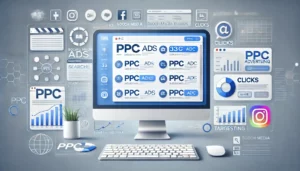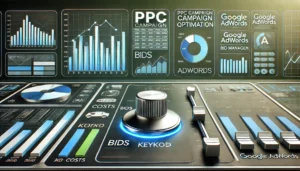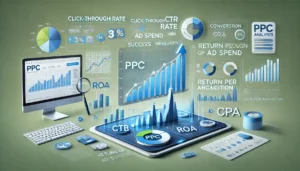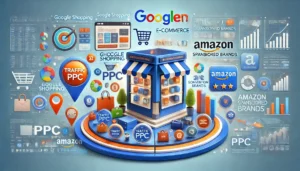Expanded PPC FAQs: Your Questions Answered

Pay-Per-Click (PPC) advertising can be a game-changer for businesses looking to boost their online presence and drive targeted traffic to their websites. However, diving into the world of PPC can be daunting due to its many intricacies. This article aims to answer the expanded PPC FAQs (frequently asked questions), from understanding its basics to implementing advanced strategies. Whether you’re a newbie or a seasoned marketer, this guide will provide valuable insights to help you succeed with PPC.
Key Takeaways
- PPC stands for Pay-Per-Click, a type of online advertising where advertisers pay a fee each time their ad is clicked.
- Choosing the right platform and conducting thorough keyword research are crucial steps in setting up a successful PPC campaign.
- Monitoring and adjusting bids, along with A/B testing ad variations, can significantly improve your PPC performance.
- Advanced strategies like remarketing and audience targeting can help you reach potential customers more effectively.
- Measuring key metrics such as conversion rates and ROI is essential for evaluating the success of your PPC campaigns.
Expanded PPC FAQs: Understanding the Basics of PPC
What is PPC Advertising?
PPC, or Pay-Per-Click, is a type of online advertising where we pay a fee each time someone clicks on our ad. It’s a way to buy visits to our site, rather than earning them organically. PPC ads can appear on search engines like Google and Bing, as well as on social media platforms and other websites. This method allows us to target specific keywords and demographics, making our marketing efforts more precise.
How Does PPC Work? (Expanded PPC FAQs)
PPC works by allowing us to bid on keywords that are relevant to our business. When someone searches for those keywords, our ad may appear in the search results. If the user clicks on our ad, we pay the bid amount. The position of our ad is determined by a combination of our bid and the quality score of our ad. The quality score is based on the relevance and usefulness of our ad and landing page to the user.
Key Benefits of PPC
- Immediate Results: Unlike SEO, which can take months to show results, PPC can drive traffic to our site almost instantly.
- Targeted Advertising: We can target our ads to specific demographics, locations, and even times of the day.
- Measurable ROI: PPC platforms provide detailed analytics, allowing us to measure the effectiveness of our campaigns and adjust them as needed.
- Budget Control: We can set a daily or monthly budget, ensuring we never spend more than we’re comfortable with.
PPC is a powerful tool for businesses of all sizes, offering flexibility and control over our advertising efforts. By understanding the basics, we can make informed decisions and maximise our return on investment.
Expanded PPC FAQs: Setting Up Your First PPC Campaign
Choosing the Right Platform
When starting with PPC, the first step is to choose the right platform. Google Ads, Bing Ads, and Facebook Ads are popular choices. Each platform has its own strengths. For instance, Google Ads offers a vast reach, while Facebook Ads allows for detailed audience targeting. Selecting the right platform depends on your business goals and target audience.
Keyword Research and Selection (Expanded PPC FAQs)
Keyword research is crucial for a successful PPC campaign. We need to identify the terms our potential customers are searching for. Tools like Google Keyword Planner can help us find relevant keywords. It’s important to choose keywords that are not only relevant but also have a good search volume and low competition. This ensures our ads reach the right people.
Creating Effective Ad Copy
Creating compelling ad copy is essential. Our ad copy should be clear, concise, and include a strong call to action. We should highlight the unique selling points of our product or service. Additionally, using ad extensions can provide extra information and increase the visibility of our ads. Remember, the goal is to entice the user to click on our ad and visit our site.
Setting up a PPC campaign might seem daunting at first, but with the right approach and tools, it becomes manageable and highly rewarding.
Expanded PPC FAQs: Optimising Your PPC Campaigns
Monitoring and Adjusting Bids
To get the most out of your PPC campaigns, we need to keep a close eye on our bids. Regularly checking and adjusting bids ensures that we are not overspending on low-performing keywords. It’s crucial to find a balance between cost and performance. We can use tools like Google AdWords PPC to help us make informed decisions.
A/B Testing Ad Variations (Expanded PPC FAQs)
A/B testing is a powerful way to see what works best in our ads. By creating different versions of our ad copy and running them simultaneously, we can identify which one performs better. This helps us refine our messaging and improve click-through rates. Remember, even small changes can make a big difference.
Improving Quality Score
Quality Score is a metric used by Google Ads PPC to measure the relevance and quality of our ads. A higher Quality Score can lead to lower costs and better ad placements. To improve it, we should focus on creating relevant ad copy, using targeted keywords, and ensuring our landing pages are user-friendly and relevant to the ad content.
Regular optimisation is key to maintaining a successful PPC campaign. By monitoring bids, testing ad variations, and improving Quality Score, we can achieve better results and maximise our return on investment.
Expanded PPC FAQs: Advanced PPC Strategies
Remarketing Techniques
Remarketing is a powerful way to re-engage users who have previously interacted with your website. By targeting these users with specific ads, we can remind them of our products or services, increasing the chances of conversion. Remarketing can significantly boost your ROI by focusing on an audience already familiar with your brand.
Utilising Audience Targeting (Expanded PPC FAQs)
Audience targeting allows us to reach specific groups of people based on their interests, behaviours, and demographics. This strategy ensures that our ads are shown to the most relevant users, improving the effectiveness of our campaigns. We can use tools like Google Ads and Facebook Ads to create detailed audience segments.
Leveraging Automation Tools
Automation tools can streamline our PPC management efforts, saving time and reducing human error. These tools can handle tasks such as bid adjustments, ad scheduling, and performance reporting. By leveraging automation, we can focus on strategy and optimisation, ensuring our campaigns run smoothly and efficiently.
Embracing advanced PPC strategies can transform your campaigns from good to great, driving better results and maximising your marketing budget.
Expanded PPC FAQs: Measuring PPC Success
Key Metrics to Track
To gauge the success of our PPC campaigns, we need to keep an eye on several key metrics. Click-Through Rate (CTR) shows how well our ads are resonating with users. Conversion Rate tells us how effective our landing pages are at turning visitors into customers. Return on Ad Spend (ROAS) helps us understand the revenue generated for every pound spent on ads. Lastly, Cost Per Acquisition (CPA) reveals how much it costs to gain a new customer.
Understanding Conversion Rates (Expanded PPC FAQs)
Conversion rates are crucial for measuring the effectiveness of our campaigns. A high conversion rate means our ads and landing pages are doing their job well. We should always aim to improve this rate by testing different elements of our ads and landing pages.
Calculating ROI
Calculating the return on investment (ROI) for our PPC campaigns is essential. We need to compare the revenue generated from our ads to the total cost of running those ads. This includes not just the ad spend but also any additional costs like a PPC audit. A positive ROI means our campaigns are profitable.
Regularly reviewing these metrics helps us make informed decisions and drive strategic growth in our advertising efforts.
Expanded PPC FAQs: Common PPC Challenges and Solutions
Dealing with Click Fraud
Click fraud is a significant issue in PPC advertising. It happens when competitors or bots click on your ads with no intention of converting. This can drain your budget quickly. To combat this, we can use click fraud detection tools and regularly monitor our campaigns for unusual activity. Implementing IP exclusions and setting up conversion tracking can also help mitigate this problem.
Managing Budget Constraints (Expanded PPC FAQs)
Budget constraints are a common challenge, especially for small businesses. It’s crucial to allocate your budget wisely to get the most out of your PPC campaigns. We recommend starting with a smaller budget and gradually increasing it as you see positive results. Focus on high-performing keywords and consider using automated bidding strategies to maximise your ROI.
Overcoming Ad Fatigue
Ad fatigue occurs when your audience sees the same ad too many times, leading to decreased engagement. To avoid this, we should regularly update our ad creatives and rotate different ad variations. A/B testing can help identify which ads perform best. Additionally, using remarketing techniques can keep your audience engaged without overwhelming them.
PPC campaigns require constant monitoring and adjustment to stay effective. By addressing these common challenges, we can ensure our campaigns remain successful and cost-efficient.
Expanded PPC FAQs: PPC for Different Business Types
E-commerce PPC Strategies
For e-commerce businesses, PPC can be a game-changer. We can use platforms like Google Shopping and Amazon Sponsored Brands to showcase products directly to potential buyers. This approach helps drive targeted traffic to your online store, increasing the chances of conversions. It’s essential to optimise product feeds and use high-quality images to attract clicks.
Local Business PPC Tips (Expanded PPC FAQs)
Local businesses can benefit immensely from PPC by targeting customers in their specific geographic area. Using Google Ads, we can set up location-based campaigns to ensure our ads are shown to users nearby. Including local keywords and creating ads that highlight local services or products can make a significant difference.
B2B PPC Approaches
B2B companies often have longer sales cycles, making PPC a bit more complex. We should focus on platforms like LinkedIn Ads, where we can target decision-makers in specific industries. Offering valuable content, such as whitepapers or webinars, can help capture leads and nurture them through the sales funnel.
PPC strategies need to be tailored to fit the unique needs of different business types. By understanding the specific challenges and opportunities within each sector, we can create more effective campaigns.
Expanded PPC FAQs: Integrating PPC with Other Marketing Channels
Combining PPC and SEO
When we combine PPC and SEO, we can achieve a powerful synergy. PPC provides immediate visibility, while SEO builds long-term organic presence. Using both strategies together ensures that we capture traffic from both paid and organic sources. This dual approach can significantly boost our overall online presence.
PPC and Social Media Marketing (Expanded PPC FAQs)
PPC and social media marketing work hand in hand to reach a broader audience. Social media platforms like Facebook and Instagram offer targeted PPC options that can complement our existing campaigns. By leveraging these platforms, we can engage users who might not be actively searching for our products but are interested based on their interests and behaviours.
Email Marketing and PPC
Integrating email marketing with PPC can enhance our customer engagement. We can use PPC to attract new leads and then nurture these leads through email campaigns. This combination allows us to maintain a consistent communication flow with our audience, increasing the chances of conversion.
By integrating PPC with other marketing channels, we create a cohesive strategy that maximises our reach and effectiveness.
Expanded PPC FAQs: Future Trends in PPC
The Rise of AI in PPC
Artificial Intelligence (AI) is transforming PPC advertising. We can now use AI to automate bidding, optimise ad placements, and even create ad copy. AI tools can analyse vast amounts of data quickly, helping us make better decisions. This means more efficient campaigns and better results.
Voice Search and PPC (Expanded PPC FAQs)
Voice search is becoming more popular with the rise of smart speakers and voice assistants. This trend is changing how we approach keyword research. We need to focus on natural language and long-tail keywords. Voice search queries are often longer and more conversational, so our PPC strategies must adapt.
The Impact of Privacy Regulations
Privacy regulations like GDPR and CCPA are affecting how we collect and use data in PPC campaigns. We must be more transparent about data usage and ensure compliance. This might limit some targeting options, but it also builds trust with our audience. Being upfront about data practises can enhance our brand’s reputation.
Staying ahead of these trends is crucial for successful PPC campaigns. Embracing new technologies and adapting to changes will keep us competitive in the ever-evolving digital landscape.
Expanded PPC FAQs: Choosing a PPC Agency
What to Look for in a PPC Agency
When selecting a PPC agency, we need to consider several factors. First, look at their experience and expertise. A good agency should have a proven track record in managing successful campaigns. Check their case studies and client testimonials to gauge their performance. Additionally, ensure they have experience in your specific industry, whether it’s e-commerce, B2B, or local businesses.
Transparency is another crucial factor. The agency should provide clear and detailed reports on campaign performance. We should have full access to our accounts and understand the actions taken to improve results. Lastly, consider their approach to communication. Regular updates and open lines of communication are essential for a successful partnership.
Questions to Ask Potential Agencies (Expanded PPC FAQs)
Before hiring a PPC agency, we should ask some key questions:
- What is your experience with businesses like ours?
- How do you measure success in your campaigns?
- Can you provide examples of past successes?
- What is your approach to keyword research and selection?
- How do you handle budget management and bid adjustments?
- What kind of reporting and communication can we expect?
These questions will help us understand their capabilities and ensure they align with our goals.
Evaluating Agency Performance
Once we’ve hired a PPC agency, it’s important to regularly evaluate their performance. We should monitor key metrics such as click-through rates, conversion rates, and return on investment (ROI). Comparing these metrics against our initial goals will help us determine if the agency is delivering value.
It’s also essential to review the agency’s reports and ask for explanations of any significant changes in performance. If the agency is proactive in suggesting improvements and transparent about their strategies, it’s a good sign that they are committed to our success.
Choosing the right PPC agency can make a significant difference in our online advertising efforts. By asking the right questions and regularly evaluating performance, we can ensure we’re getting the best possible results from our investment.
Expanded PPC FAQs: DIY PPC vs. Hiring Professionals
Pros and Cons of DIY PPC
When we manage our own PPC campaigns, we have full control over every aspect. This means we can make quick adjustments and tailor our strategies to our specific needs. However, this approach requires a significant time investment and a steep learning curve. Without proper knowledge, we might end up spending more money than necessary.
When to Consider Hiring Experts (Expanded PPC FAQs)
Hiring a professional PPC agency can be a game-changer. They bring expertise and experience to the table, which can lead to better results. If we find ourselves struggling to keep up with the demands of PPC management or not achieving our desired results, it might be time to consider hiring experts. They can handle the complexities and free up our time for other important tasks.
Cost Comparison
The cost of DIY PPC is mainly our time and the money spent on ads. On the other hand, hiring a professional involves paying for their services, which can vary widely. Here’s a simple comparison:
| Aspect | DIY PPC | Hiring Professionals |
|---|---|---|
| Time Investment | High | Low |
| Expertise Level | Varies | High |
| Cost | Ad spend only | Service fees + Ad spend |
Balancing the costs and benefits of each approach is crucial. We need to consider our budget, time, and expertise before making a decision.
Deciding between managing your own PPC campaigns and hiring professionals can be tough. Doing it yourself might save money, but it takes a lot of time and effort. On the other hand, experts can bring better results faster. Want to see how your ads are doing? Get a free, human review of your ads performance today.
Conclusion
In conclusion, PPC advertising is a powerful tool that can help businesses of all sizes reach their goals. Whether you’re looking to increase brand awareness, drive more traffic to your website, or generate more leads and sales, PPC offers a flexible and measurable way to achieve these objectives. By understanding the basics and continuously optimising your campaigns, you can make the most out of your PPC efforts. Remember, the key to success lies in staying informed and adapting to the ever-changing digital landscape. If you have any further questions or need expert guidance, don’t hesitate to reach out to our team of PPC specialists.
Frequently Asked Questions
What is PPC advertising?
PPC stands for Pay Per Click. It’s a type of online advertising where businesses pay a fee each time someone clicks on their ad. It helps drive traffic to websites and can lead to sales or other actions.
How does PPC work?
In PPC, you bid on keywords that people might use in search engines. When someone searches using those keywords, your ad might appear. If they click on it, you pay a small fee.
Why is PPC important?
PPC is important because it helps businesses reach a large audience quickly. It can drive traffic to your site, increase sales, and boost brand awareness.
What are the benefits of PPC?
The benefits of PPC include immediate visibility in search results, targeted advertising, and measurable results. You only pay when someone clicks on your ad, making it a cost-effective option.
How do I start a PPC campaign?
To start a PPC campaign, choose a platform like Google Ads, do keyword research, create compelling ad copy, and set a budget. Monitor and adjust your campaign as needed.
What is a Quality Score in PPC?
Quality Score is a metric used by Google Ads to determine the relevance and quality of your ads and keywords. A higher Quality Score can lead to lower costs and better ad placements.
What is click fraud?
Click fraud occurs when someone clicks on your ads with malicious intent, like to drain your budget. Monitoring your campaigns and using anti-fraud tools can help prevent this.
How do I measure the success of my PPC campaign?
You can measure the success of your PPC campaign by tracking key metrics like click-through rates (CTR), conversion rates, and return on investment (ROI). These metrics help you understand how well your ads are performing.
Author
Search Blog
Free PPC Audit
Subscribe to our Newsletter
The Voices of Our Success: Your Words, Our Pride
Don't just take our word for it. With over 100+ five-star reviews, we let our work-and our satisfied clients-speak for us.
"We have been working with PPC Geeks for around 6 months and have found Mark and the team to be very impressive. Having worked with a few companies in this and similar sectors, I rate PPC Geeks as the strongest I have come across. They have taken time to understand our business, our market and competitors and supported us to devise a strategy to generate business. I value the expertise Mark and his team provide and trust them to make the best recommendations for the long-term."
~ Just Go, Alasdair Anderson




